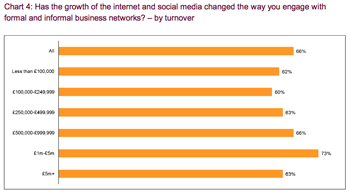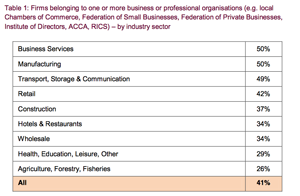 Social media is changing the ways that SMEs are networking with other businesses, and we were intriqued to read the latest research from The Open University Business School as it provides some interesting insights. The findings are based on a survey carried out of 1,109 business owners in Jan/Feb of this year. This survey by The Open University Business School was to gather opinions and trends from UK businesses. So what did they have to say?
Social media is changing the ways that SMEs are networking with other businesses, and we were intriqued to read the latest research from The Open University Business School as it provides some interesting insights. The findings are based on a survey carried out of 1,109 business owners in Jan/Feb of this year. This survey by The Open University Business School was to gather opinions and trends from UK businesses. So what did they have to say?
The report states that good old London and the South of England are leading the recovery with 66% of businesses believing that the growth of the internet and social media has changed how they engage with formal or informal networks they are part of for the better.
51% of larger businesses (i.e. £5m+ turnover band) are members of at least one business or professional organisation, compared to only 30% of those in the smallest turnover band.
32% say they mainly engage with organisations online, with a massive 80% using a combination of both face-to-face and online communication.
59% use business or professional organisations as a source of general advice or information. 48% use it for shared experience and social contact, and 41% for specific advice on technology or best practices. This trend demonstrates that it pays to actually be “social” on social media.
When asked to explain how social media and being online had changed their networking habits, the greatest response referred to “faster and easier communication with their customers and others”. Those interviews referred to having positive feelings towards the use of social media for networking: “Almost instant communication allows for more rapid arrangements of events, more sharing of news and information.”
On the negative side, there still remains some skepticism around the use of social networks in business with one reporting that they “use e-mail and the internet extensively. I am averse to social networking, believing that it collects far too much information on me without, in my case, fulfilling any useful purpose. I do not advertise, as news of a void in any of my properties rapidly becomes known, and tenants approach me.”
Further questions included listing their reasons for not belonging to any business or professional organisation. This query identified six main reasons preventing businesses from joining a network:
Insufficient time for networking activity
Costs associated with membership
Lack of perceived benefits of membership
Doubts over the quality of services provided
Personal lack of interest in socialising or networking
 So how do those trends compare internationally? This makes very interesting reading indeed as a forecast of worldwide social network use in November 2013 by eMarketer predicted that Germany would overtake the UK as the top social networking country in Western Europe by the end of 2014. In the 2013 year-end report by Xing (a business social networking website in Germany, similar to LinkedIn) they report now having over 14 million registered members, 7 million of which are German-speaking.
So how do those trends compare internationally? This makes very interesting reading indeed as a forecast of worldwide social network use in November 2013 by eMarketer predicted that Germany would overtake the UK as the top social networking country in Western Europe by the end of 2014. In the 2013 year-end report by Xing (a business social networking website in Germany, similar to LinkedIn) they report now having over 14 million registered members, 7 million of which are German-speaking.
Eurostat (the statistical office of the European Union) published a report in December 2013 that looked as Europe as a whole. This claims that 30% of enterprises in the European Union now actively use social media. We were surprised to learn that only 73% have a website, we thought with the advent of easy to build site technology this figure would have been higher.
Overall figures for the proportion of firms engaged in informal networks were surprisingly low at only 18%, with the highest proportions recorded for firms in the business services sector (28%). These were followed by Hotels and Restaurants at 23% and Transport, Storage & Communication at 23%. Dealing with many different types of businesses on a daily basis, this would echo our own experience.
30% use at least one type of social media, although only 8% have a formal policy. This would seem logical with the superman speeds of the growth of the industry, it’s moving faster than businesses can keep up. An interesting point for some of you is that 11% use multimedia content-sharing websites, this is an area of opportunity. We were also surprised to read that only 10% of businesses have blogs or micro blogs. With such a huge part of SEO (search engine optimization) being built around blogging sites we thought this figure would be higher. This is also an area of opportunity.
The most interesting response we saw was this one:
“We do not meet anyone, neither client nor supplier face-to-face. We aim to do everything online and over the phone. This saves a great deal of time traveling and preparing meetings. It also means that we have an office with lots of staff at their desks, ready to take calls, enquiries and orders.”
The latest ONS UK labour market statistics point to further growth in entrepreneurs with an net increase of 172,000 between October and December 2013. This lead to an overall figure of those go getters now totaling 4.37 million.
You can read the full Open University Business School report here.




